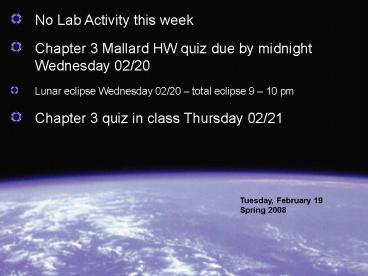PHY 102 S08 - PowerPoint PPT Presentation
1 / 20
Title:
PHY 102 S08
Description:
... Lab Activity this week. Chapter 3 Mallard HW quiz due by midnight Wednesday 02/20 ... Energy in the Earth-Sun System. incoming solar energy. solar energy reflected ... – PowerPoint PPT presentation
Number of Views:104
Avg rating:3.0/5.0
Title: PHY 102 S08
1
- No Lab Activity this week
- Chapter 3 Mallard HW quiz due by midnight
Wednesday 02/20 - Lunar eclipse Wednesday 02/20 total eclipse 9
10 pm - Chapter 3 quiz in class Thursday 02/21
Tuesday, February 19 Spring 2008
2
Energy...continuation...
- Chapter 3
Great Idea The many different forms of energy
are interchangeable, and the total amount of
energy in an isolated system is conserved.
3
Interchangeability of Energy
Fundamental property of the universe every form
of energy can be converted to every other form of
energy.
4
Interchangeability of Energy
Figure 3-4 Energy changes during a bungee jump
G EP K EK E elastic energy
T ET thermal energy
5
Energy in the Earth-Sun System
Earths atmosphere
thermal energy reradiated
100
solar energy absorbed
35
incoming solar energy
incident solar energy
10
solar energy reflected
solar energy consumed
solar energy reflected
6
Energy Consumption on Earth
Conversion of solar energy into chemical
potential energy through the trophic levels
7
Release of Energy Back to Space
Use of stored energy to generate electricity,
obtain fuel, accomplish work Eventually, stored
energy is released as heat, or thermal energy,
back into space
8
Law of Conservation of Energy
First law of thermodynamics
While the energy in an isolated system may change
from one form to another, the total amount of
energy does not change it is conserved
Any change in the total energy of a system arises
from transfer of energy between the system and
its surroundings.
9
Our Energy Future
- Current world energy consumption
- 4.7 1020 J/yr
- largely based on fossil fuels (oil, coal, and
gas).
Advantages cheap, high-grade Disadvantages
nonrenewable, human and environmental health
impacts
http//en.wikipedia.org/wiki/World_energy_resource
s_and_consumption
10
Alternate Energy Sources
Advantages renewable, (relatively)
clean Disadvantages expensive, low-efficiency,
storage, lack of infrastructure
- Current world energy consumption
- 4.7 1020 J/yr
- Solar energy reaching Earth
- 2 1024 J/yr
11
In-class exercises
12
Concept Question 1
Equal forces are used to move blocks A and B
across the floor. Block A has twice the mass of
block B, but block B moves twice the distance
moved by block A. Which block, if either, has
the greater amount of work done on it?
13
Concept Question 2
A string is used to pull a wooden block across
the floor. The string makes an angle to the
horizontal as shown in the diagram.
- Does the force applied via the string do work on
the block? - Is the total force involved in doing work or just
a portion of the total force?
14
Concept Question 3
In the situation pictured below, if there is a
frictional force opposing the motion of the
block, does this frictional force do work on the
block?
15
Concept Question 4
If there is just one force acting on an object,
does its work necessarily result in an increase
in the objects kinetic energy?
16
Concept Question 5
Two balls of the same mass are accelerated by
different net forces such that one ball gains a
velocity twice that of the other ball in the
process. Is the work done by the net force
acting on the faster-moving ball twice that done
on the slower-moving ball?
17
Sample Problem 1
A woman does 160 J of work to move a table 4 m
across the floor. What is the magnitude of
the force that the woman applied to the table if
this force is applied in the horizontal direction?
18
Sample Problem 2
A rope applies a horizontal force of 180 N to
pull a crate a distance of 2 m across the floor.
A frictional force of 120 N opposes the motion.
- What is the work done by the force applied by the
rope? - What is the work done by the frictional force?
- What is the total work done on the crate?
19
Sample Problem 3
A net force of 60 N accelerates a 4-kg mass from
rest over a distance of 10 m.
- What is the work done by this net force?
- What is the increase in kinetic energy of the
mass? - What is the final velocity of the mass?
20
Sample Problem 4
At the low point in its swing, a pendulum bob
with a mass of 0.2 kg has a velocity of 5
m/s.
- What is its kinetic energy at the low point?
- Ignoring air resistance, how high will the bob
swing above the low point before reversing
direction?






























